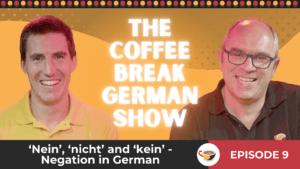You may have already come across some long German words in your experience as a German learner – and they can be very long!
Why does this happen? It’s mostly because German allows us to join different words together to form a new one, called a compound word.
The Coffee Break German Show is a podcast series of bite-sized, friendly conversations, in which we demystify tricky German language topics. In the latest episode, Thomas and Olivera discuss how to construct and understand German compound words.
They discuss the rules for forming these words by looking at the most common group of them – the compound nouns.
Continue reading to find out more and why not listen to the podcast as you go?
What are compound nouns?
Let’s start off with a couple of examples of compound nouns, so that you can see what they are and how they work:
das Stachelschwein (der Stachel + das Schwein)
porcupine
(spike + pig)
der Bahnhof (die Bahn + der Hof)
the railway station
(railway + yard)
An important tip is to start by looking at the last word in the chain of words. This is useful for a number of reasons:
- This last part determines the gender of the noun.
- It also determines how you would form the plural.
- It gives the greatest clue as to what you are talking about (often the words before it just narrow down details or qualify that last part).
Let’s take a few compound nouns that have the same ending. You can see how the first part of each word gives the details that differentiate the nouns from one another:
die Sprachschule
language school
die Grundschule
primary school
die Hauptschule
high school
Note that compound nouns can contain other elements than just nouns. This includes verbs, adjectives, and prepositions. However, the last element is always a noun.
Let’s look at some examples of these.
Nouns formed with adjectives
Here are some examples of compound nouns formed with an adjective:
das Hochhaus
skyscraper (literally, “high house”)
der Feinschmecker
gourmet (literally, “fine taster”)
Nouns formed with verbs
The following compound nouns are formed using a verb:
der Schwimmunterricht
swimming lesson
die Sprechblase
speech bubble
Nouns formed with more than two words
It is also common to have compound nouns formed with more than two words. For example:
das Geburtstagsgeschenk
(Geburt + Tag + Geschenk)
birthday present
(birth + day + present)
To make the compound noun plural, you only have to make the last word plural. So, in the case of the previous example, it would be:
die Geburtstagsgeschenke
birthday presents
There are also some compound nouns that are made up of two or more individual parts and which don’t make sense if you translate them literally, but instead are used as metaphors. For example:
die Saukälte
really cold
der Mordsspaß
a lot of fun
Time to test yourself
Let’s work out the meaning of the following compound nouns. When you’re ready, scroll down to the bottom of the article to find the answers.
- der Marmeladenglasverschluss
- der Haustürschlüssel
- die Donaudampfschiffahrtselektrizitätenhauptbetriebswerkbauunterbeamtengesellschaft
Let’s review

Although they can seem daunting, once you get the hang of compound nouns in German, you will find them quite natural. It’s all about practice!
If you found this post interesting, make sure to listen to the full episode with Thomas and Olivera on The Coffee Break German Show. This is the series in which we look at a range of topics for German learners, so make sure to subscribe to our podcast feed and our channel on YouTube.
Plus! To get regular free German lessons in your inbox, you can sign up for our short (coffee-break-sized) email lessons that will help you improve your German. You will also hear from Mark, the founder of Coffee Break Languages, giving advice for language learners at any level. Sign up below!
Happy Coffee Breaking!
PS. Here are the answers to our challenge:
- der Marmeladenglasverschluss – jam jar lid
- der Haustürschlüssel – house / front door key
- die Donaudampfschiffahrtselektrizitätenhauptbetriebswerkbauunterbeamtengesellschaft – Association for subordinate officials of the main maintenance building of the Danube steam shipping electrical services
This one was even a challenge for Thomas and Olivera, so well done if you managed to piece together even some of the elements. This word is a great example of just how long German compound nouns can be!



